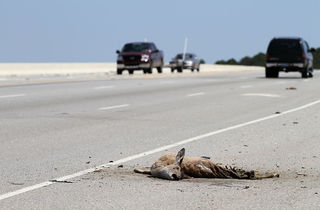
We credit Charles Darwin with the discovery of biological evolution as evidenced by giraffes’ necks and finches’ beaks. However, the great scientist understood that not only anatomy but behavior has been shaped by natural selection. The underlying concept of evolutionary psychology is straightforward. The ways in which we feel, think and perceive have consequences for whether we survive and reproduce. And to the extent that our mental abilities and predispositions are heritable, our descendants will share our psychological proclivities.
When it comes to objects that are potentially dangerous, evolution favors anxious genes. Our ancestors were better off to err on the side of caution. Mistaking a twisted stick for a snake, a tumbling leaf for a spider, or a grass seed for a louse would have been better than ignoring these cues. A "false positive" meant an unnecessary flinch or some pointless scratching, while a false negative meant elimination from the gene pool. As the eminent psychologist Aaron Beck put it: “The cost of survival of the lineage may be a lifetime of discomfort.”
Our evolutionary history as soft, slow sources of protein and vulnerable targets of venom quite reasonably account for our tendency to be alarmed by creatures that can eat, sting, or bite us. Cultural and technological change happen must faster than genetic change, so we are left with minds and bodies poised for dangers on the savannah while trying to stay safe on the freeway.
It will take millennia before we evolve the psychological tendency to fear guns and automobiles in proportion to their likelihood of killing us. In the US, this deadly duo accounts for 600 times more deaths than all animal-related fatalities. Even so, entomophobes are onto something given that the most likely animals to kill us are the stinging insects; bees, wasps and hornets are responsible for about 50 deaths per year, primarily through allergic reactions. Aside from work-related deaths involving livestock, the next most lethal animals are dogs (19 deaths/year) followed by spiders and snakes (each at 6 deaths/year). However, the clear “winner” is vehicle-animal collisions with 165 deaths/year—more than all of the other animal-related fatalities combined.
As for predators, save your adrenaline. In the last century, bears, mountain lions and sharks have killed only 77 people in the United States (on par with the number killed by firearms or vehicles in a typical day). However, there is one ancient fear that still makes sense—much of humanity has reason to be worried about blood-thirsty insects. Malaria causes nearly 10-times more deaths around the globe than all of the vehicles and guns in the United States. So it is that we are the descendants of hominids with a psychological disposition to dodge predators—and to swat mosquitoes and pit nits.
Evolutionary psychology offers a compelling explanation for the infested mind. But is this theory more than a just-so story? In my next blog posting, we’ll consider the evidence for an innate fear of insects.


